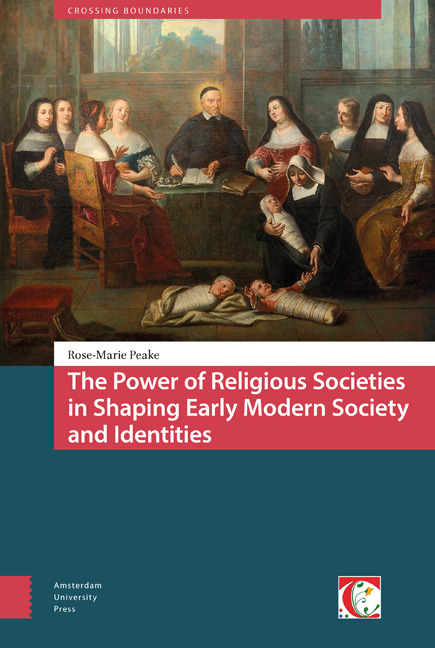Book contents
- Forntmatter
- Contents
- Acknowledgements
- Three Worlds, Three Portraits: Introduction
- 1 At the Cradle: Gender and Power in Seventeenth-century Parisian Society
- 2 Portrait of Louise de Marillac: Ensuring Resources for Moral Management
- 3 Portrait of the Daughter of Charity: Safeguarding the Execution of Moral Management
- 4 Portrait of the Underprivileged: Managing the Ignorant Substitute of Christ
- From Conservative Moral Management to Survival: Conclusions
- Sources
- Note on Vocabulary
- Index
Three Worlds, Three Portraits: Introduction
Published online by Cambridge University Press: 21 November 2020
- Forntmatter
- Contents
- Acknowledgements
- Three Worlds, Three Portraits: Introduction
- 1 At the Cradle: Gender and Power in Seventeenth-century Parisian Society
- 2 Portrait of Louise de Marillac: Ensuring Resources for Moral Management
- 3 Portrait of the Daughter of Charity: Safeguarding the Execution of Moral Management
- 4 Portrait of the Underprivileged: Managing the Ignorant Substitute of Christ
- From Conservative Moral Management to Survival: Conclusions
- Sources
- Note on Vocabulary
- Index
Summary
Abstract
The chapter introduces the subject, approach, and focus of the book. The book offers a new insight into the history of the unenclosed Catholic Company the Daughters of Charity (les Filles de la Charité) by focusing on the contents and implementation of its value system in the first half of the seventeenth century. The chapter discusses the backbone of the book, the methodological concept of moral management which is a ‘travelling concept’ (Mieke Bal) utilized here for the first time in research on seventeenth-century Catholicism. Moral management is defined as the implementation, within the organization and its charitable activities, of a specific value system that is expressed in actions, behaviour, and mentalities, and that aims at securing the survival of the Company threatened by its perplexing religious identity.
Keywords: moral management; travelling concepts; religious identity; performance studies; early modern Catholicism
One Sunday in April 1659, a group of women had gathered in a modest two-floor house in the faubourg Saint-Lazare in Paris. The clamour of the city seemed to be far away: the house, built of brick, had a walled front yard and garden as well as a stable and apricot trees. The clothing of the women further enriched the rustic idyll: with their brimless hats and long grey dresses with little white collars they looked like typical peasant women of the Parisian region. Some of them had indeed come to the house from the outskirts of the capital whereas others had just simply come down to the communal hall from the upper quarters of the residence where they lived. But on that particular Sunday no-one had come to Paris to sell their produce. They had come to the capital to visit the motherhouse of their Catholic community called the Filles de la Charité, or the Daughters of Charity, and to hear their superior general speak. ‘Dear sisters,’ father Vincent de Paul began his talk, ‘this conference is on our dear sister Barbe Angiboust (1605-1658), whom God has taken to himself’. With these words began a lengthy reminiscence about one of the most cherished members of the Company. The superior general as well as the superior of the Company, the devout widow Louise de Marillac, and the women, one after another, got up and testified about the virtuous life of their fellow sister.
- Type
- Chapter
- Information
- Publisher: Amsterdam University PressPrint publication year: 2020

